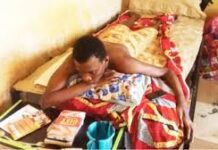
Ajija is as frail as you possibly can be when alive. The four-year-old should be actively playing with friends but she can barely stand. When she is checked by a health worker, she is unsurprisingly registered as severely malnourished.
“I feel helpless as I can’t do anything, during the past two years life has been hard, there is little food and many illnesses,” her mother Halima says desperately to me.
This is Gwoza, a remote area of Borno state, on Nigeria’s northeastern border with Cameroon. The makeshift health clinic is packed with mothers bringing their babies and young children for malnutrition screening and treatment.
 |
| © UNICEF/UN028415/Esiebo |
| Mariam Muhammed, 30, feeds her daughter Fanne Saleh, 1, Ready-to-Use Therapeutic Food (RUTF). The mother and daughter are displaced from Mafa in Borno state. |
Ajija is tragically not alone. With more areas across northeast Nigeria becoming accessible to humanitarian assistance, the true impact of this crisis is being revealed. There are now nearly a quarter of a million children suffering from severe acute malnutrition in Borno, a result of more than three years of violence that has devastated the area.
Too dangerous to farm the land, to access markets or even safe water, families and particularly young children have missed out on the essentials for life. For an estimated one million children who still can’t be reached, we can only imagine their fate.
This tragedy for Nigeria’s children was first projected on to the world map in April 2014, when more than 270 girls were abducted by Boko Haram from a school in Chibok. They were also not alone. At least 4,000 young women (ages 18-24), girls and boys have been abducted in the affected northern states of Nigeria since 2009, and some 7,000 women and girls have reportedly suffered sexual violence.
Now Borno’s children are back in the spotlight – this time affected by a food and malnutrition crisis that rivals any. But we cannot rely on intermittent peaks of world attention to call for the support needed. We cannot wait for another tragedy to occur. Work goes on, using any available means possible, even despite anattack on a humanitarian convoy.
Firstly, it’s about saving the lives of children we can reach, many of whom have been uprooted from their homes. Providing what is essentially a simple eight-week course of ready-to-use therapeutic food can help children recover from severe acute malnutrition. But this only works if they also have access to primary health care, safe water and sanitation to avoid preventable and treatable childhood illnesses that can be a matter of life or death for already weakened children.
To achieve this, we must continue to help rehabilitate and upgrade local health clinics, some 60 per cent of which have been partially or completely destroyed across Borno state. We must continue to provide training for health workers and a sustainable source of medical supplies, including the life-saving therapeutic food. At the same time, through a network of community volunteers, with the contacts and knowledge of the local area, we need to rapidly identify and manage cases of child malnutrition.
 |
| © UNICEF/UN025790/Esiebo |
| Falmata, 6 months, is weighed to determine her nutrition status. A week earlier, she was brought to a UNICEF-supported health centre in Dalori IDP camp, Maiduguri, Borno State, but she remains malnourished. |
There is some progress. This year some 75,000 children have been treated for severe acute malnutrition. Since April, nearly twice as many malnutrition screenings have taken place – from 288,000 to some 500,000 – meaning that more children are being seen and treated on a regular basis. But nobody anticipated the true scale of the crisis.
While we fight to save lives, we need to also help children recover mentally from the horrors they have lived through. Returning some normality through play, safe learning opportunities and psychological support where necessary can help bring back childhoods.
Families and children ask for so little. They simply want access to medical facilities and to find health workers and medicines. They want to go to school and find teachers, desks, books and pens. They want hand pumps that deliver safe water.
From Gwoza to Maiduguri and Port Harcourt to Lagos, Nigeria’s most valuable resource is its children. Saving, protecting and tapping in to this resource requires committed and sustained support. Only then can we provide the essential services and normality that children and their families need to rebuild their lives.
Jean Gough was the UNICEF Representative to Nigeria from 2013 until September 2016.


























